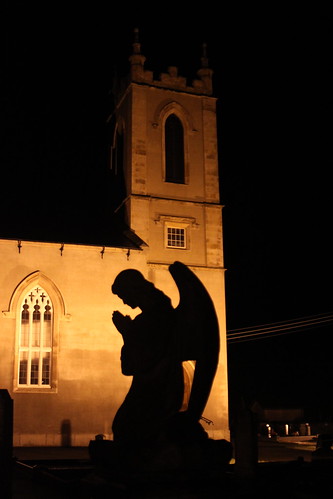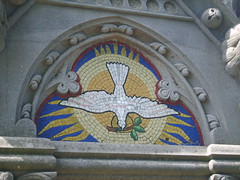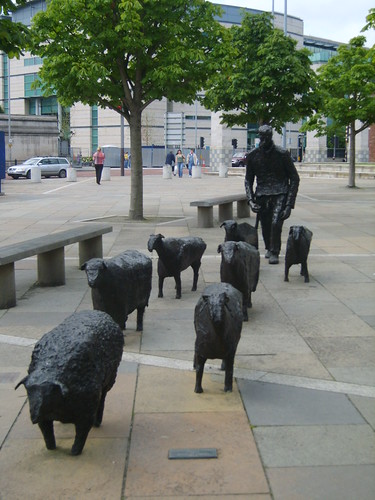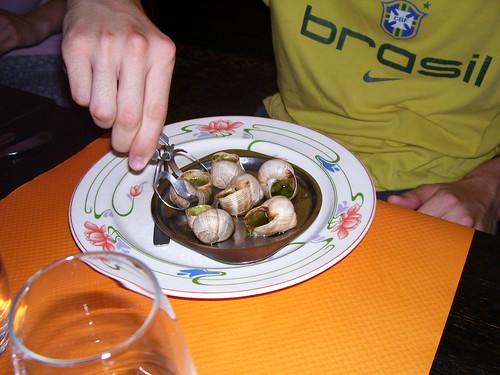Tonight it is easy to give thanks to God, surrounded by all the good things God has given us. We celebrate God’s provision, the fruit, and vegetables, flowers, fish and livestock and all our food. It’s easy to say that God is good when we see it in material blessings. But what if our circumstances aren’t just as pleasant? What if we suffered total wipeout? Would we still be as quick to praise?
For you it might not be a lack of fig blossoms, or no olive oil; but what if you were to lose your job, or get bad news in the doctor’s surgery? Could we still praise the Lord in the midst of these circumstances?
Our reading may not have been one you were expecting for a harvest thanksgiving, and yet, as I was preparing, this was the passage I kept coming back to. The prophet Habakkuk (as well as not being easy to say or spell), is one of the lesser known prophets, his short book tucked away near the end of the Old Testament. Yet his message, and in particular his trust in God, speaks volumes to us, and challenges us as to where we put our trust.
This little book is a two-way conversation between Habakkuk and his God. Habakkuk looks at society around him, God’s people are failing to live in the way they should, and he cries out ‘O LORD, how long?’ Why isn’t God doing something to help his people? God’s reply is surprising and terrifying - he is bringing the Chaldeans (Babylonians) on Judah. He’s bringing a worse, more evil people, to discipline Judah, God’s people. How can this be? Well, as God says, this is how he has chosen to act - but one day Babylon too will be brought down.
So as we come to chapter 3, Habakkuk responds in prayer. He appeals to God to act as he did before, in salvation and judgment, just as he did when he brought Israel out of Egypt. And it’s as if Habakkuk is sitting watching the enemy arrive, coming over the hill to defeat his people, God’s people. How will Habakkuk respond?
He knows dark days are coming. Difficult days are just around the corner. Total devastation and destruction of their way of life; their farms and livings wiped out. In verse 17, it’s as if Habakkuk takes you on a tour of his farm, as if working through a checklist of his produce:
‘Fig tree? Did not blossom. Vines? No grapes. Olive? No produce. Fields? No crops. Fold? Empty of flocks. Stalls? No herd present.’ Can you imagine this farm with nothing growing but weeds; nothing to eat, or sell, or make. Completely bare. ‘Disaster on a total scale’ writes one commentator. A disastrous harvest. So how would you respond?
Or perhaps farming means slightly less to you. What if there was no food in any of the shops; even Tesco and Asda were bare? How would you respond? Or if you were to get your P45, no job and no prospects? What do you do now?
In these last few days we’ve seen a total meltdown in the world of Blackberries - not the fruit to make jam - but the mobile phone. Something wasn’t working, and for three days, peoples’ phones and internet wasn’t working. To hear some people on Facebook complaining it was as if their world had ended! It was the same with the iPhone, upgrading to the latest software with phones crashing - as the headline writers hoped it was Apple and Blackberry Crumble.
Maybe you’re not fussed about so-called smart phones; not worried about unemployment; but what is that one thing you couldn’t do without, the thing you care about most - perhaps your grandchildren, or your possessions, or your pet hamster. How would you cope without that?
Put yourself in Habakkuk’s shoes for a moment. What do you expect him to say next? He’s gone through the farm stock list, and it’s completely empty. How would you continue? We have nothing so... pull yourself together God, what do you think you’re doing? Don’t you care about us God, can’t you see we’re fading away here?
Let’s see what Habakkuk says: ‘Though the fig tree should not blossom, nor fruit be on the vines, the produce of the olive fail and the fields yield no food, the flock be cut off from the fold and there be no heard in the stalls, yet will I rejoice in the LORD; I will take joy in the God of my salvation.’
I’m almost certain you didn’t expect to hear the word rejoice, or joy. We’re suffering terribly, and yet Habakkuk wants to rejoice? How can he rejoice in suffering? Is it possible for us to do the same?
In those two lines, Habakkuk refers to God in two different ways, which together show us why he continues to rejoice, even in those difficult times. ‘Yet I will rejoice in the LORD.’ The LORD (capital letters), otherwise Yahweh / Jehovah, is the covenant name of God. It’s God’s name revealed to Moses when he called to him from the burning bush. The Lord God Almighty chose the people of Israel to be his people, and he would be their God. He has pledged himself to care and protect them through the covenant with them at Mount Sinai - and it’s this covenant making and covenant keeping God that Habakkuk is trusting in.
Even when the people of God have failed him, have walked away from him, the LORD is still keeping his covenant with them, working his purposes out. It’s this faithfulness of the LORD of the covenant that leads Habakkuk to rejoice.
So often we can get so attached to stuff that it becomes like a god to us - an idol. As those things are removed from us, everything comes back into perspective, and we see more clearly that we don’t need God and stuff - that God is enough for all that we need, and that he is in control.
Just think of Job, the prosperous man of the Old Testament with his sons and daughters and sheep and camels and oxen and donkeys and servants. In one day, it was all taken away from him, and how does he respond? ‘Naked I came from my mother’s womb, and naked I shall return. The LORD gave, and the LORD has taken away; blessed by the name of the LORD.’ Can we say that, as we face difficult days? But what is it that allows us to say that? How can we lose so much or suffer in incredible ways and yet still hold fast to God?
We see it in the second way Habakkuk describes God. He says: ‘I will take joy in the God of my salvation.’ Habakkuk has a personal relationship with God - he knows him as his own Saviour. And this makes all the difference.
God is not just an abstract concept; not just a bearded man sitting on a cloud - the Lord God Almighty, the covenant making God is my Saviour - his covenant is with me; he is my rescuer!
Friends, I do not know what circumstances and situations you find yourself in tonight. I don’t know what problems you brought with you this evening, or what awaits you in the days to come. You might even think that what Habakkuk had to deal with was as nothing compared to the weight of the burden you’re carrying this evening. Friend, you do not need to deal with it alone. Even tonight, you can find that the Lord God draws near to help you in time of need; that the Lord God will be your salvation - through the work of the wonderful Saviour Jesus.
The apostle Paul writes of Jesus: ‘For you know the grace of our Lord Jesus Christ, that though he was rich, yet for your sake he became poor, so that you by his poverty might become rich.’ (2 Cor 8:9) These riches we’re promised aren’t earthly riches, not gold or money; but heavenly riches, the incomparable riches of his grace, freely given to us. And this is what the Lord Jesus went through to save us and grace us:
‘who, for the joy that was set before him endured the cross, despising the shame, ‘ (Heb 12:2) The Lord Jesus lost, not just his farming, not just his produce, but everything in order to save us and restore us:
‘who, though he was in the form of God, did not count equality with God a thing to be grasped, but made himself nothing, taking the form of a servant, being born in the likeness of men. And being found in human form, he humbled himself to the point of death, even death on a cross.’
When we see what the Lord Jesus endured in order to rescue us; to be our salvation, then we can face our problems confident that God stands with us, that his love is constantly with us - and that’s something we can rejoice in, even in the darkest day. With Habakkuk we can say that ‘God the Lord is my strength.’ He will keep us going, no matter what we’re facing.
You might have been a Christian for a long time, but it’s so easy to get caught up with material things that we lose sight of the blessings we have in Christ Jesus. As an African Christian said in our home church a long time ago - you in Northern Ireland have God and stuff; we just have God. But God is enough!
Maybe you have heard of Jesus, you know the salvation he offers, but you’ve never taken that step of faith. The Lord is near, he will become your salvation this night, if you will simply trust in him - you need not fear the future with the Lord Jesus as your salvation and your strength. Let us pray.
This sermon was preached at the Harvest Thanksgiving in Cornafanog Mission Hall on Thursday 13th October 2011.











